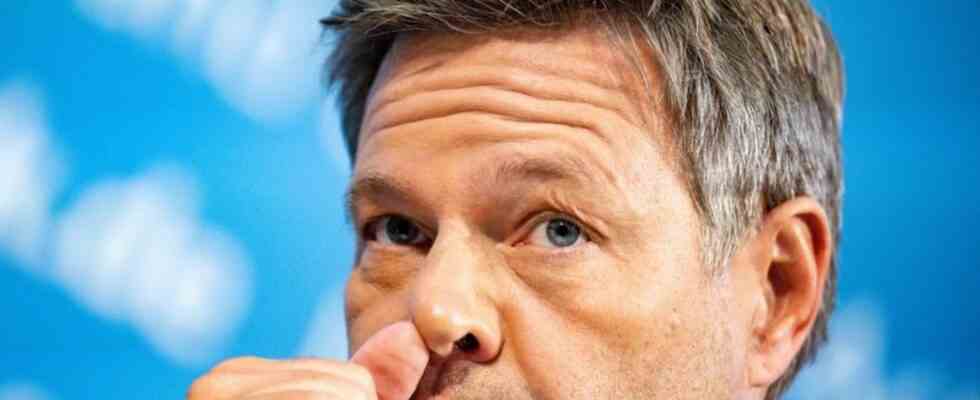Package against energy crisis
Union supports billions in aid – Habeck dampens expectations
Economics Minister Habeck warns that not every price increase can be avoided: “Not even with this gigantic 200 billion euros.” photo
© Michael Kappeler/dpa
A “double boom” of up to 200 billion euros is intended to protect citizens from high energy prices. That’s the traffic light plan. Now the Economics Minister is warning: Despite the gas price cap, there will be price increases.
Federal Minister of Economics Robert Habeck has dampened expectations of the planned gas price cap. One cannot subsidize the gas price as much as it was in 2021, said the Green politician on Deutschland-Funk. “And not for a very long time. Gas and energy as a whole will cost the German economy more than it did in the very good years.”
Also, not every price increase can be avoided. “Not even with this gigantic 200 billion euros.”
The Union signaled support for the aid package planned by the federal government of up to 200 billion euros. The German gas storage facilities are now almost full, but the storage operators are still skeptical.
What help the government has decided
On Thursday, the traffic light coalition announced a new “defense shield” of up to 200 billion euros to support consumers and companies because of rising energy prices. The controversial gas levy is off the table – there should be a gas price brake for that.
At least for part of consumption, the prices should be capped in such a way that private households and companies are not overwhelmed. What that means exactly is still unclear. A commission is to make proposals by mid-October.
“Wirtschaftswise” Veronika Grimm, who heads the commission, said on ZDF “heute journal up:date”: “The design will now be challenging, but we will certainly be making proposals very, very quickly, within days, weeks set the table”.
The deputy chairman of the Union faction, Jens Spahn, has signaled support for the planned aid package. “We support the traffic light’s goal of lowering prices and securing supplies,” Spahn told the newspapers of the Funke media group. CDU Vice President Andreas Jung made a similar statement. It is right that systemically important companies should be supported and prices curbed, he said on Friday in the ARD “Morgenmagazin”.
Relief not yet noticeable in October
Habeck had previously outlined how the gas price brake could be designed. “What is obvious is that you subsidize a basic requirement, but the peak consumption has to be paid for on the market. So the more gas you use, the more expensive it becomes,” said Habeck on the RTL program “Nachtjournal”. The basic requirement is either determined via the corresponding gas consumption of the past year or a percentage of it can be determined, which is then cheaper, said Habeck.
Chancellor Olaf Scholz (SPD) had also dampened expectations that the instruments adopted would lead to noticeable relief for consumers as early as October. “It will certainly not be that easy, because we have to organize that the high prices for gas that are paid on the world market have to be subsidized,” Scholz said on the “RTL Aktuell” program.
In the ZDF “heute journal” Scholz justified taking out further loans for the gigantic aid package. “This is an acute crisis, you have to act urgently,” he said.
How the “double boom” should be financed
The up to 200 billion euros should not come from the regular federal budget, but from the Economic Stabilization Fund (WSF). This special fund was formed during the Corona crisis to rescue companies and is being revived.
The President of the Federal Audit Office, Kay Scheller, criticized this. “Special funds create a lack of transparency. They obscure budget truth and clarity,” he told the Politico news portal.
Despite a total filling level of over 91.5 percent, the gas storage association is skeptical as to whether the storage target of 95 percent by November 1st will be achieved. “The increasing gas consumption due to falling temperatures is increasingly reducing the storage options,” said Sebastian Bleschke, Managing Director of the Storage Association Initiative Energies Storage (Ines), the German Press Agency.
According to the Energy Industry Act, German storage facilities must be 85 percent full on October 1st. The total filling level had already reached this mark on September 2nd. “Very low consumption by industrial customers in the past few weeks and months has certainly made a very significant contribution to this.”

